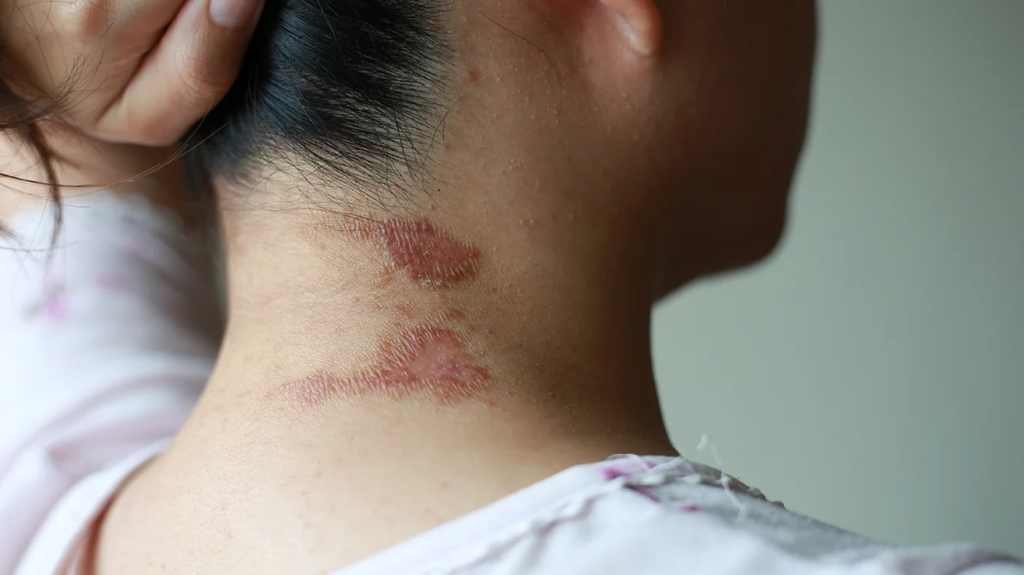Are sleepless nights due to relentless itching from neurodermatitis keeping you awake? Living with neurodermatitis can be challenging, but there’s hope on the horizon. In this comprehensive guide, we’ll explore the ins and outs of neurodermatitis, the latest breakthroughs in treatment, and effective strategies to bid farewell to those itchy nights.
Understanding Neurodermatitis
Neurodermatitis is characterized by persistent itching and the formation of itchy patches on the skin, often resulting from repetitive scratching. Recognizing the visual cues, such as red, inflamed skin with scratch marks, is essential for timely diagnosis and intervention. The condition typically occurs in specific areas like the neck, wrists, forearms, and ankles. By comprehending the nuances of neurodermatitis, individuals and healthcare professionals can work collaboratively to implement targeted treatments, break the itch-scratch cycle, and enhance the overall quality of life for those affected.
What Does Neurodermatitis Look Like?
Identifying neurodermatitis hinges on recognizing its distinctive appearance. The condition manifests as red, inflamed skin marked by intensely itchy patches. Notably, these patches often bear visible scratch marks, a consequence of repetitive scratching. Neurodermatitis commonly surfaces on specific areas like the neck, wrists, forearms, and ankles. The visual cues, including the characteristic redness and scratch marks, serve as key indicators for diagnosis.

Neurodermatitis vs. Eczema: Unraveling the Connection
Neurodermatitis, a localized form of eczema, manifests as intensely itchy patches resulting from repetitive scratching. These persistent patches, often with visible scratch marks, typically occur in specific areas like the neck, wrists, forearms, and ankles. The condition is characterized by a cyclic itch-scratch cycle, making it crucial to address both the physical and psychological aspects of the disorder for effective management.
Eczema, a broader term encompassing various inflammatory skin conditions, includes neurodermatitis as one of its specific types. Unlike neurodermatitis, eczema refers to a range of disorders marked by skin inflammation, redness, and itching. It includes diverse manifestations such as atopic dermatitis, contact dermatitis, and dyshidrotic eczema, each with distinct characteristics and triggers.
Neurodermatitis vs. Eczema:
- Neurodermatitis is a localized, specific type of eczema.
- Eczema is a broader term encompassing various inflammatory skin conditions.
- Both involve itching and skin inflammation but differ in their specific characteristics and manifestations.
Neurodermatitis Treatment: A Holistic Approach
Now, let’s explore the breakthroughs in neurodermatitis treatment that are changing the landscape of skincare. Embracing a holistic approach involves addressing both the physical and psychological aspects of this condition.
1. Targeting the Itch: Medications and Topical Treatments
To combat the persistent itching, dermatologists often prescribe antihistamines and corticosteroid creams. These medications work to alleviate inflammation and soothe the itching sensation, providing much-needed relief.
2. Lifestyle Modifications: Breaking the Itch-Scratch Cycle
Beyond medications, lifestyle modifications play a crucial role in managing neurodermatitis. Keeping the skin well-moisturized, wearing comfortable clothing, and practicing stress-reducing techniques can contribute to breaking the itch-scratch cycle.

3. The Role of an Online Eczema Dermatologist
In the digital age, accessing specialized care is easier than ever. An online eczema dermatologist can provide expert guidance, personalized treatment plans, and ongoing support, empowering individuals to manage neurodermatitis eczema effectively from the comfort of their homes.
How to Treat Neurodermatitis: Practical Tips for Daily Life
Armed with the knowledge of effective treatments, it’s time to explore practical tips for managing neurodermatitis in everyday life. Incorporating these strategies can make a significant difference in reducing symptoms and improving overall well-being.
1. Gentle Skincare Routine
Adopting a gentle skincare routine is paramount for individuals with neurodermatitis. Use mild, fragrance-free products and avoid harsh soaps to prevent skin irritation.
2. Mind-Body Connection: Stress Management Techniques
Given the psychosomatic nature of neurodermatitis, stress management is essential. Meditation, yoga, and deep breathing exercises can all help you feel better mentally and physically.
3. Recognizing Triggers: Empowering Yourself
Identifying and avoiding triggers is a proactive step in managing neurodermatitis. Whether it’s certain fabrics, environmental factors, or specific foods, understanding triggers empowers individuals to take control of their condition.
Living with neurodermatitis presents a myriad of challenges, both physical and emotional, requiring a holistic approach for effective management. The constant itching and visible skin manifestations can impact daily life, leading to discomfort and self-consciousness.
Individuals grappling with neurodermatitis often find themselves navigating a delicate balance between skincare routines, lifestyle modifications, and stress management techniques. Fostering a supportive environment is crucial, as emotional well-being plays a significant role in the condition’s course.
While the journey may pose ups and downs, empowerment through education and a proactive approach to triggers can contribute to a better quality of life. Seeking assistance from healthcare professionals and connecting with support networks ensures that individuals can confidently face the challenges posed by neurodermatitis, ultimately paving the way for a more comfortable and fulfilling daily existence.
Online Eczema Dermatologist: Your Virtual Partner in Skin Health
The advent of telemedicine brings forth new possibilities in healthcare accessibility. An online eczema dermatologist serves as a virtual partner, offering expert advice, personalized consultations, and continuous support. This modern approach to dermatological care revolutionizes the way individuals manage neurodermatitis.
Final Thoughts
In conclusion, the journey to bid farewell to itchy nights caused by neurodermatitis is multifaceted. By understanding the condition, recognizing visual cues, and embracing holistic treatment approaches, individuals can break free from the shackles of persistent itching. Remember, seeking the guidance of an online eczema dermatologist can be a game-changer in your neurodermatitis management journey. Here’s to a future filled with peaceful, itch-free nights and a renewed sense of well-being!
FAQs
- Can Neurodermatitis Affect Mental Health?
Living with neurodermatitis can impact mental health due to persistent itching and visible skin manifestations. Seeking emotional support alongside medical treatment is crucial for a holistic approach.
- Are There Natural Remedies for Neurodermatitis?
While medical interventions are essential, some find relief through natural remedies like oatmeal baths and coconut oil. However, consult with a dermatologist before incorporating these into your routine.
- Can Neurodermatitis Be Triggered by Stress Alone?
Stress is a known trigger for neurodermatitis, but other factors contribute. Identifying and managing stress, alongside lifestyle changes, forms a comprehensive strategy for effective treatment.
- Is Sun Exposure Beneficial for Neurodermatitis?
Sun exposure may help some with neurodermatitis, but it can worsen symptoms for others. Consult with a dermatologist to determine if controlled sun exposure is suitable for your specific condition.
